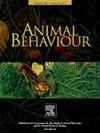横纹鱼的交配选择复制行为
IF 2.3
2区 生物学
Q2 BEHAVIORAL SCIENCES
引用次数: 0
摘要
交配决定依赖社会学习(即“配偶选择复制”)在分类学上很普遍,并且可以影响种群中性选择的强度。理论表明,社会学习和个体学习的平衡,以及个体倾向于复制配偶选择的稳定行为,可能有助于维持种群内交配偏好的变化。本研究以横纹短尾鱼(Brachyrhaphis rhabdophora)为研究对象,测试了社会信息对该物种择偶行为的影响,以及个体内复制行为的稳定性。在观察和选择两个潜在伴侣之前,女性观察者先进行了两个女性示威者之间的二分选择测试,并从女性示威者那里获得了社会信息。我们发现,无论是否获得社会信息,雌性横纹肌白蝇在雄性之间表现出强烈的偏好。然后,我们在大约一个月后重新测试个体,发现个体在试验之间以一致的方式使用社会信息。综上所述,我们的数据表明,横纹肌雌蜂在做出交配决定时既考虑了个人信息,也考虑了社会信息,并且种群内个体之间存在复制策略的异质性。这些发现有助于我们越来越多地了解影响社会学习性交配偏好进化的因素。本文章由计算机程序翻译,如有差异,请以英文原文为准。
Mate choice copying behaviour in the livebearing fish Brachyrhaphis rhabdophora
Reliance on social learning for mating decisions (i.e. ‘mate choice copying’) is taxonomically widespread and can influence the strength of sexual selection in a population. Theory suggests that a balance of social and individual learning, as well as stable individual behaviour in the propensity to copy mate choices, may help maintain variation in mating preferences within a population. Here, we focused on the livebearing fish species Brachyrhaphis rhabdophora to test the role of social information on mate preference behaviour in this species and the stability of copying behaviour within an individual. Female observers underwent a dichotomous choice test between two female demonstrators prior to observing and choosing between two potential mates with or without social information from female demonstrators. We found that B. rhabdophora females displayed strong preferences between males regardless of access to social information. We then retested individuals approximately 1 month later and found that individuals used social information in a consistent manner between trials. Taken together, our data suggest that B. rhabdophora females consider both personal and social information when making mating decisions and that heterogeneity in copying strategies exists among individuals within a population. These findings contribute to our growing understanding of the factors that shape the evolution of socially learned mating preferences.
求助全文
通过发布文献求助,成功后即可免费获取论文全文。
去求助
来源期刊

Animal Behaviour
生物-动物学
CiteScore
4.60
自引率
8.00%
发文量
236
审稿时长
10.2 weeks
期刊介绍:
Growing interest in behavioural biology and the international reputation of Animal Behaviour prompted an expansion to monthly publication in 1989. Animal Behaviour continues to be the journal of choice for biologists, ethologists, psychologists, physiologists, and veterinarians with an interest in the subject.
 求助内容:
求助内容: 应助结果提醒方式:
应助结果提醒方式:


